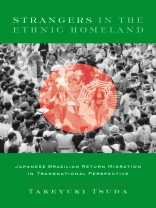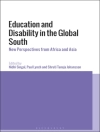Since the late 1980s, Brazilians of Japanese descent have been ‚return‘ migrating to Japan as unskilled foreign workers. With an immigrant population currently estimated at roughly 280, 000, Japanese Brazilians are now the second largest group of foreigners in Japan. Although they are of Japanese descent, most were born in Brazil and are culturally Brazilian. As a result, they have become Japan’s newest ethnic minority.
Drawing upon close to two years of multisite fieldwork in Brazil and Japan, Takeyuki Tsuda has written a comprehensive ethnography that examines the ethnic experiences and reactions of both Japanese Brazilian immigrants and their native Japanese hosts. In response to their socioeconomic marginalization in their ethnic homeland, Japanese Brazilians have strengthened their Brazilian nationalist sentiments despite becoming members of an increasingly well-integrated transnational migrant community. Although such migrant nationalism enables them to resist assimilationist Japanese cultural pressures, its challenge to Japanese ethnic attitudes and ethnonational identity remains inherently contradictory. Strangers in the Ethnic Homeland illuminates how cultural encounters caused by transnational migration can reinforce local ethnic identities and nationalist discourses.
Inhaltsverzeichnis
Preface: The Japanese Brazilians as Immigrant Celebrities
Acknowledgments
Introduction: Ethnicity and the Anthropologist: Negotiating Identities in the Field
Part 1. Minority Status
1. When Minorities Migrate: The Japanese Brazilians as Positive Minorities in Brazil and Their Return Migration to Japan
2. From Positive to Negative Minority: Ethnic Prejudice and ‚Discrimination“ Toward the Japanese Brazilians in Japan
Part 2. Identity
3. Migration and Deterritorialized Nationalism: The Ethnic Encounter with the Japanese and the Development of a Minority Counteridentity
4. Transnational Communities Without a Consciousness? Transnational Connections, National Identities, and the Nation-State
Part 3. Adaptation
5. The Performance of Brazilian Counteridentities: Ethnic Resistance and the Japanese Nation-State
6. ‚Assimilation Blues“: Problems Among Assimilation-Oriented Japanese Brazilians
Conclusion: Ethnic Encounters in the Global Ecumene
Epilogue: Caste or Assimilation? The Future Minority Status and Ethnic Adaptation of the Japanese Brazilians in Japan
References
Index
Über den Autor
Takeyuki Tsuda is the associate director of the Center for Comparative Immigration Studies at the University of California at San Diego.












